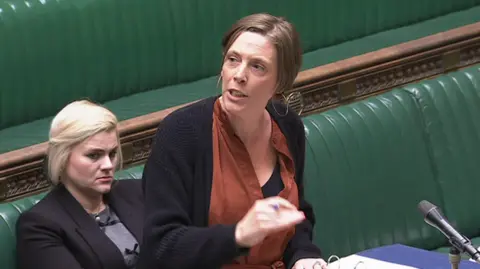Recent statements from Home Office Minister Jess Phillips suggest an expansion of inquiries related to grooming gangs beyond the five that have already been announced. Phillips articulated her expectation for further inquiries as the government continues to address the significant issue of sexual abuse in the UK. These comments were made during a parliamentary discussion, and she expressed her intention to release additional details following an audit that will clarify the scale and nature of the grooming problems in various regions.
The audit by Baroness Louise Casey, originally slated for completion in mid-April, is now anticipated to be published later in May, as Phillips confirmed. While she refrained from speculating on the content of Casey’s findings or which specific areas might be affected, Phillips committed to acting on the evidence presented. This was reiterated against a backdrop of rising public frustration regarding the handling and transparency of grooming gang investigations.
Conservative MP Chris Philp raised concerns regarding the limited scope of these local inquiries, asserting that the inquiries must have the power to compel testimonies to ensure thorough investigations. His comments highlight a growing call for a comprehensive national inquiry into grooming gangs, reflecting fears that local inquiries may not sufficiently address the scale of the issue.
Additionally, during the session, shadow Home Secretary Yvette Cooper scrutinized the mechanisms available to ensure that local councils, particularly those reluctant to engage, must initiate inquiries. Citing Bradford’s council, which recently stated that an additional inquiry may yield no new insights after their independent review in 2021, Cooper pressed Phillips for clarity on governmental strategies to enforce compliance among local authorities.
The discussions surrounding Bradford illustrate a wider apprehension among some local councils to confront uncomfortable truths about past failings in handling sexual abuse cases. Conservative MP Robbie Moore pointed out Bradford’s hesitance as indicative of deeper, systemic issues that may remain unexamined.
In response, Phillips reassured parliamentarians, promising action should Casey’s audit reveal issues among specific councils. Her assurances aimed to consolidate confidence in the government’s commitment to tackling grooming gang activities, emphasizing that victims’ voices and needs must be prioritized.
The topic of grooming gangs has come under renewed scrutiny, particularly in light of past decades dominated by high-profile cases involving predominantly Pakistani males convicted of sexual offenses against mainly white females. The gravity of this issue has been underscored by a national inquiry led by Prof. Alexis Jay, which examined the wider dimensions of child sexual abuse, including the role of grooming gangs.
Moreover, the discourse gained momentum earlier this year when tech entrepreneur Elon Musk openly called for a second national inquiry, a suggestion that received backing from several opposition members. Home Secretary Yvette Cooper, however, stopped short of initiating a national inquiry but instead proposed an audit to assess the current conditions surrounding gang-based exploitation.
Amid these developments, she allocated £5 million for victim-centered, locally-led inquiries in Oldham and other as-yet-unnamed areas, while appointing Tom Crowther KC—who has previously led inquiries— to help develop a framework for these investigations. Crowther’s uncertain position within the process has also been a point of concern among stakeholders involved with the abuse inquiries.
In a recent move, Phillips reiterated the government’s determination to proceed with the planned five inquiries while hinting at the possibility of expanding this number as new data emerges. She indicated that the framework detailing how the inquiries would be conducted will be available soon, coinciding with the expected release of Baroness Casey’s review later this month. Phillips expressed a commitment to let the findings guide decision-making processes, ensuring that she follows the facts to wherever victims are identified as needing support.
As conversations about the handling of grooming gang investigations continue, the implications for policy and public trust in governmental oversight remain substantial. Phillips’s responses indicate a willingness to confront challenges while recognizing the role of local authorities in addressing historical shortcomings. The pressing question remains whether this approach will yield the necessary reforms and tangible changes that victims and advocates fervently seek.



